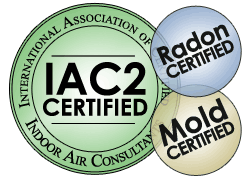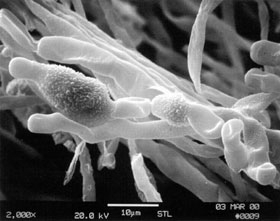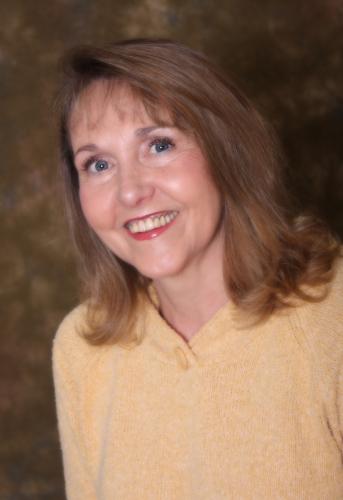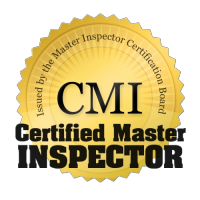 |
Mold Testing in Coeur d'Alene and Spokane
Mold Testing and Inspection
Russ and Jeanne are lab certified Spokane, Sandpoint and Coeur d'Alene North Idaho mold inspectors and perform mold testing and inspections for both surface and air sampling. Results will disclose both the extent and types of mold present. In some cases, it may become necessary to hire a mitigation specialist to clean the mold. Mold Inspections and Mold Testing are performed in Coeur d'Alene, Hayden, Post Falls, Kellogg, Sandpoint and surrounding areas in North Idaho and SPOKANE, WA.

Ten Things You Should Know About Mold
1. Potential health effects and symptoms associated with mold exposures include allergic reactions, asthma, and other respiratory complaints.
2. There is no practical way to eliminate all mold and mold spores in the indoor environment; the way to control indoor mold growth is to control moisture.
3. If mold is a problem in your home or school, you must clean up the mold and eliminate sources of moisture.
4. Fix the source of the water problem or leak to prevent mold growth.
5. Reduce indoor humidity (to 30-60%) to decrease mold growth by:
a. venting bathrooms, dryers, and other moisture-generating sources to the outside;
b. using air conditioners and de-humidifiers;
c. increasing ventilation;
d. and using exhaust fans whenever cooking, dishwashing, and cleaning.
6. Clean and dry any damp or wet building materials and furnishings within 24-48 hours to prevent mold growth.
7. Clean mold off hard surfaces with water and detergent, and dry completely. Absorbent materials such as ceiling tiles, that are moldy, may need to be replaced.
8. Prevent condensation: Reduce the potential for condensation on cold surfaces (i.e., windows, piping, exterior walls, roof, or floors) by adding insulation.
9. In areas where there is a perpetual moisture problem, do not install carpeting (i.e., by drinking fountains, by classroom sinks, or on concrete floors with leaks or frequent condensation).
10. Molds can be found almost anywhere; they can grow on virtually any substance, providing moisture is present. There are molds that can grow on wood, paper, carpet, and foods.
Mold Testing And Mold Inspection
Is a Mold inspection and mold testing necessary? Yes! Surface and air sampling is necessary - especially after cleanup - to determine if an area has been adequately cleaned or remediated. As we do not perform any remediation services, we are not looking to create work for ourselves; we only want to determine if the mold present is elevated, by the lab's standards, creating a hazard to you or your family. Testing for mold should be conducted by professionals such as ourselves who have specific experience in designing mold sampling protocols, sampling methods, and providing interpreted results. Sample analysis should follow analytical methods recommended by the American Industrial Hygiene Association (AIHA), the American Conference of Governmental Industrial Hygienists (ACGIH), or other professional organizations.
Inspecting for hidden mold problems
Mold inspections may be difficult, and your Sandpoint, Spokane and Coeur d'Alene mold inspectors will proceed with caution when the investigation involves disturbing potential sites of mold growth. For example, removal of wallpaper can lead to a massive release of spores if there is mold growing on the underside of the paper. If you believe that you may have a hidden mold problem, consider hiring us as your experienced professionals.
Suspicion Of Hidden Mold
You may suspect hidden mold if a building smells moldy, but you cannot see the source, or if you know there has been water damage and residents are reporting health problems. Mold may be hidden in places such as the back side of dry wall, wallpaper, or paneling, the top side of ceiling tiles, the underside of carpets and pads, etc. Other possible locations of hidden mold include areas inside walls around pipes (with leaking or condensing pipes), the surface of walls behind furniture (where condensation forms), inside ductwork, and in roof materials above ceiling tiles (due to roof leaks or insufficient insulation). Hiring us as your Sandpoint, Spokane and Coeur d'Alene mold inspectors will assure that the best techniques will be used to find the hidden mold.
Why Is Mold Growing In My Home?
Molds are part of the natural environment. Outdoors, molds play a part in nature by breaking down dead organic matter such as fallen leaves and dead trees, but indoors, mold growth should be avoided. Molds reproduce by means of tiny spores; the spores are invisible to the naked eye and float through outdoor and indoor air. Mold may begin growing indoors when mold spores land on surfaces that are wet. There are many types of mold in North Idaho, Sandpoint, Spokane and Coeur d'Alene, and none of them will grow without water or moisture.
Mold Basics
- The key to mold control is moisture control.
- If mold is a problem in your home, you should clean up the mold promptly and fix the water problem.
- It is important to dry water-damaged areas and items within 24-48 hours to prevent mold growth.
- Mold inspections can determine the presence of mold.
- Mold testing can determine the type of mold present.
Can Mold Cause Health Problems?
Molds are usually not a problem indoors, unless mold spores land on a wet or damp spot (even your lungs) and begin growing. Molds have the potential to cause health problems. Molds produce allergens (substances that can cause allergic reactions), irritants, and in some cases, potentially toxic substances (mycotoxins). Inhaling or touching mold or mold spores may cause allergic reactions in sensitive individuals. Allergic responses include hay fever-type symptoms, such as sneezing, runny nose, red eyes, and skin rash (dermatitis). Allergic reactions to mold are common. They can be immediate or delayed. Molds can also cause asthma attacks in people with asthma who are allergic to mold. In addition, mold exposure can irritate the eyes, skin, nose, throat, and lungs of both mold-allergic and non-allergic people. Symptoms other than the allergic and irritant types are not commonly reported as a result of inhaling mold. Research on mold and health effects is ongoing. This web page provides a brief overview; it does not describe all potential health effects related to mold exposure in Hayden, Sandpoint, Spokane and Coeur d'Alene. For more detailed information consult a health professional. You may also wish to consult your state or local health department.
How Do I Remove Mold?
It is impossible to get rid of all mold and mold spores indoors; some mold spores will be found floating through the air and in house dust. The mold spores will not grow if moisture is not present. Indoor mold growth can and should be prevented or controlled by controlling moisture indoors. If there is mold growth in your home, you must clean up the mold and fix the water problem. If you clean up the mold, but don't fix the water problem, then, most likely, the mold problem will come back.
Who Should Perform Mold Cleanup?
Who should do the cleanup depends on a number of factors. One consideration is the size of the mold problem. If the moldy area is less than about 10 square feet (less than roughly a 3 ft. by 3 ft. patch), in most cases, you can handle the job yourself, following the guidelines below.
- If there has been a lot of water damage, and/or mold growth covers more than 10 square feet, consult the U.S. Environmental Protection Agency (EPA) guide: Mold Remediation in Schools and Commercial Buildings. Although focused on schools and commercial buildings, this document is applicable to other building types. It is available free by calling the EPA Indoor Air Quality Information Clearinghouse at (800) 438-4318.
- If you choose to hire a contractor (or other professional service provider) to do the cleanup, make sure the contractor has experience cleaning up mold. Check references and ask the contractor to follow the recommendations of the EPA, the guidelines of the American Conference of Governmental Industrial Hygenists (ACGIH), or other guidelines from professional or government organizations.
- If you suspect that the heating/ventilation/air conditioning (HVAC) system may be contaminated with mold (it is part of an identified moisture problem, for instance, or there is mold near the intake to the system), consult EPA's guide Should You Have the Air Ducts in Your Home Cleaned? before taking further action. Do not run the HVAC system if you know or suspect that it is contaminated with mold - it could spread mold throughout the building. Call (800) 438-4318 for a free copy.
- If the water and/or mold damage was caused by sewage or other contaminated water, then call in a professional who has experience cleaning and fixing buildings damaged by contaminated water.
- If you have health concerns, consult a health professional before starting cleanup.
Tips And Techniques
The tips and techniques presented in this section will help you clean up your mold problem. Professional cleaners or remediators may use methods not covered in this website. Please note that mold may cause staining and cosmetic damage. It may not be possible to clean an item so that its original appearance is restored.
- Fix plumbing leaks and other water problems as soon as possible. Dry all items completely.
- Scrub mold off hard surfaces with detergent and water, and dry completely.
- Absorbent or porous materials, such as ceiling tiles and carpet, may have to be thrown away if they become moldy. Mold can grow on or fill in the empty spaces and crevices of porous materials, so the mold may be difficult or impossible to remove completely.
- Avoid exposing yourself or others to mold.
- Do not paint or caulk moldy surfaces. Clean up the mold and dry the surfaces before painting. Paint applied over moldy surfaces is likely to peel.
- If you are unsure about how to clean an item, or if the item is expensive or of sentimental value, you may wish to consult a specialist in Sandpoint, Spokane and Coeur d'Alene. Specialists in furniture repair, restoration, painting, art restoration and conservation, carpet and rug cleaning, water damage, and fire or water restoration are commonly listed in phone books. Be sure to ask for and check references. Look for specialists who are affiliated with professional organizations.
Personal Protection When Cleaning Mold
- Avoid breathing in mold or mold spores. In order to limit your exposure to airborne mold, you may want to wear an N-95 respirator, available at many hardware stores in Sandpoint, Spokane and Coeur d'Alene and from companies that advertise on the Internet. (They cost about $12 to $25.) Some N-95 respirators resemble a paper dust mask with a nozzle on the front, others are made primarily of plastic or rubber and have removable cartridges that trap most of the mold spores from entering. In order to be effective, the respirator or mask must fit properly, so carefully follow the instructions supplied with the respirator. Please note that the Occupational Safety and Health Administration (OSHA) requires that respirators fit properly (fit testing) when used in an occupational setting; consult OSHA for more information (800-321-OSHA).
- Wear gloves. Long gloves that extend to the middle of the forearm are recommended. When working with water and a mild detergent, ordinary household rubber gloves may be used. If you are using a disinfectant, a biocide such as chlorine bleach, or a strong cleaning solution, you should select gloves made from natural rubber, neoprene, nitrile, polyurethane, or PVC. Avoid touching mold or moldy items with your bare hands.
- Wear goggles. To avoid getting mold or mold spores in your eyes, safety goggles that do not have ventilation holes are recommended.
How Do I Know When The Remediation Or Cleanup Is Finished?
You must have completely fixed the water or moisture problem before the cleanup or remediation can be considered finished.
- You should have completed mold removal. Visible mold and moldy odors should not be present. Please note that mold may cause staining and cosmetic damage.
- Call us at 208.660.8877 the schedule a Clearance Mold testing in Sandpoint, Spokane and Coeur d'Alene homes.
- You should have revisited the site(s) shortly after cleanup and it should show no signs of water damage or mold growth.
- People should have been able to occupy or re-occupy the area without health complaints or physical symptoms.
- Ultimately, this is a judgment call; there is no easy answer. If you have concerns or questions call the EPA Indoor Air Quality Information Clearinghouse IAQ INFO at (800) 438-4318.
Moisture And Mold Prevention And Control Tips
- Moisture control is the key to mold control, so when water leaks or spills occur indoors - ACT QUICKLY. If wet or damp materials or areas are dried 24-48 hours after a leak or spill happens, in most cases mold will not grow.
- Clean and repair roof gutters regularly.
- Make sure the ground slopes away from the building foundation, so that water does not enter or collect around the foundation.
- Keep air conditioning drip pans clean and the drain lines unobstructed and flowing properly.
- Keep indoor humidity low. If possible, keep indoor humidity below 60 percent (ideally between 30 and 50 percent) relative humidity. Relative humidity can be measured with a moisture or humidity meter, a small, inexpensive ($10-$50) instrument available at many hardware stores.
- If you see condensation or moisture collecting on windows, walls or pipes ACT QUICKLY to dry the wet surface and reduce the moisture/water source. Condensation can be a sign of high humidity and a source of mold in Sandpoint, Spokane and Coeur d'Alene homes.
Reduce humidity
- Vent appliances that produce moisture, such as clothes dryers, stoves, and kerosene heaters to the outside where possible. (Combustion appliances such as stoves and kerosene heaters produce water vapor and will increase the humidity unless vented to the outside.)
- Use air conditioners and/or de-humidifiers when needed tp prevent mold in Sandpoint, Spokane and Coeur d'Alene.
- Run the bathroom fan or open the window when showering. Use exhaust fans or open windows whenever cooking, running the dishwasher or washing dishes, etc.
Actions That Will Help Prevent Condensation
- Reduce the humidity (see above).
- Increase ventilation or air movement by opening doors and/or windows, when practical. Use fans as needed.
- Cover cold surfaces, such as cold water pipes, with insulation.
- Increase air temperature.
Cleanup And Biocides
Biocides are substances that can destroy living organisms. The use of a chemical or biocide that kills organisms such as mold (chlorine bleach, for example) is not recommended as a routine practice during mold cleanup. There may be instances, however, when professional judgment may indicate its use (for example, when immune-compromised individuals are present). In most cases, it is not possible or desirable to sterilize an area; a background level of mold spores will remain - these spores will not grow if the moisture problem has been resolved. If you choose to use disinfectants or biocides, always ventilate the area and exhaust the air to the outdoors. Never mix chlorine bleach solution with other cleaning solutions or detergents that contain ammonia because toxic fumes could be produced.
Please note: Dead mold may still cause allergic reactions in some people, so it is not enough to simply kill the mold in Sandpoint, Spokane and Coeur d'Alene homes, it must also be removed.
We are your Sandpoint mold inspector, Coeur d’Alene mold inspector, Hayden mold inspector, Post Falls mold inspector, Spokane mold inspector, and Kellogg mold inspector performing mold inspections in North Idaho and surrounding areas.
What can you expect from your North Idaho home and mold inspection?
- A detailed, concise PLATINUM Inspection
- Complete Satisfaction Guarantee
- North Idaho’s Certified Master Inspector Team®
- Free Visual Mold Inspection by a Certified Mold Inspector
- We "Meet or Beat" the published rates of ANY other Certified Master Inspector® Team within 100 miles!
Home and Mold Inspections in the Greater Coeur d'Alene Area
Referred by the area's most concerned Real Estate Agents
North Idaho’s MOST TRUSTED Home Inspectors:
Inspected Once, Inspected Right
Russell Spriggs is North Idaho's first Certified Master Inspector. Russell's abilities to perform home inspections / mold testing, and ethically serve you, have been certified and recognized by an independent Certification Board (www.CertifiedMasterInspector.org). Russ serves as the President of the Idaho State Chapter of the InterNational Association of Certified Home Inspectors(InterNACHI) and is the past President of the Spirit Lake Area Chamber of Commerce.
Coeur d'Alene Home Inspectors guarantee you that we are here for the long haul to serve our community in the best way possible and promise you a detailed, quality home and mold inspection that includes a money-back satisfaction guarantee!
We are your Independent, Third-Party Home Inspectors throughout North Idaho, and bring over 50 years of Construction, Instruction and Home Inspection experience to your doorstep. This unique blend of professional expertise is drawn upon to conduct a thorough examination of your home’s construction and equipment. Your professional home and mold inspection is informative, educational, and safety-oriented. It is conducted in accordance with Standards of Practice criteria established by the world’s largest professional Home Inspectors’ association, the InterNational Association of Certified Home Inspectors.
Our job, as your North Idaho Home Inspector, is to determine whether the areas being inspected are functional and safe. Neither buyer, seller nor agent has any reason to be apprehensive about an honest Home Inspection. Homes being inspected do not "Fail". You are invited to join us after we investigate every major component of your investment. While we inspect, photograph and report, we are your eyes to help you LEARN your new home - from foundation to roof, the home's plumbing, electrical, heating systems and more!
A Coeur d'Alene home and mold inspection is no different than a Hayden home inspection, or a home inspection in Post Falls. The difference is in the home inspector. Remember, In Idaho, anyone with a flashlight and a stepladder may call themselves a “home inspector”. Beware of self-proclaimed “certifications”! Only InterNACHI Home Inspectors must successfully pass an examination before being accepted and Certified; over 70% of the applicants fail the exam. Many other inspector "societies" simply allow applicants to send in their membership fee, with no prior experience or testing.
What to expect from your Idaho Home Inspectors
Your Certified Home Inspection comes with this warranty:
- Honest Reports
- Up-Front Pricing
- Inspected Once, Inspected Right
- A Money-back guarantee.
- 24-Hour Emailed Report Delivery
- Written Informative and Educational Narrative Report;
- IAC2 Certified Visual Mold Inspection;
- An easy-to-read Summary Page;
- Full Photo Documentation.
Contact your Coeur d’Alene home and mold inspector to schedule your home inspection in Hayden, Post Falls, Coeur d'Alene, Kellogg, Sandpoint and all of North Idaho!




